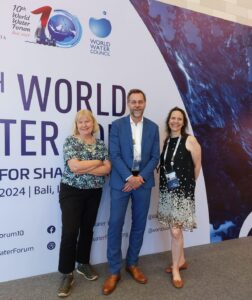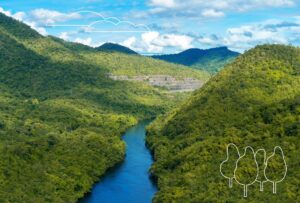Starting today, Nick Tandi and Anton Earle from SIWI’s African Regional Centre, the 2030 Water Resources Group (2030 WRG) and the South African Ministry for Water will host a week-long knowledge exchange trip to Pretoria, South Africa. The knowledge exchange places emphasis on private sector engagement in multi-stakeholder partnerships related to mining and to finding solutions for water scarce fast developing regions.
International stakeholders will gather in the city between 29 February to 4 March for a conference designed to share knowledge on the country’s efforts to address municipal water losses and mine-water management. A series of field trips to local reclamation and mining effluent treatment plants will follow the conference and provide a practical insight into the mining pollution effects South Africa has dealt with for the past 150 years.
A country built on mining
The start of the diamond rush in 1866 signified the true beginnings of massive global interest in South Africa’s mineral wealth. It was to be followed by a gold rush a decade later. The close intermingling of agriculture and mining has created many of the allocation and pollution management dilemmas we see today, for water authorities in South Africa and elsewhere. In Pretoria and Johannesburg, these issues are compounded by mining pollution effects that have accumulated since the advent of commercial mining.
One of the field visits during the knowledge exchange is to a coal mining operation in the Mpumalanga coalfield. This site serves to illustrate not only the depth of these dilemmas, but also the strides taken towards their resolution by the Department of Water and Sanitation, mining companies, and other water stakeholders.
Specific objectives of the exchange:
- Provide an opportunity for participants to gain practical insights from the South Africa water management and public-private-civil society experience, which can be used to guide water management policy and practice in their own countries;
- Provide an opportunity for partners from across 2030 WRG countries to meet, spend time together, and learn from each other;
- Enable South Africa stakeholders, as hosts, to showcase its water management achievements to senior officials from other countries.
Speakers and facilitators
- Ronnie Mckenzie, Specialist Water Demand Management support to various organizations including the World Bank, the EU and the UN
- Dhevan Govender, Senior Manager of Commercial and Business of eThekwini Water and Sanitation (EWS).
- Barbara Schreiner, Director at Pegasys and the Executive Director of the Pegasys Institute.
- Dhesigen Naidoo, CEO of the Water Research Commission, South Africa’s only dedicated water research steering and funding institution.
- Yogan Reddy, Associate Director in PwC’s Capital Projects & Infrastructure team and senior advisor to the South African Department of Water Affairs.
- Rudy Roberts Chief executive of the Union Investment Company of National Education Health and Allied Workers Union, South Africa’s (until 2014)
Resources: Download the Background document here.








